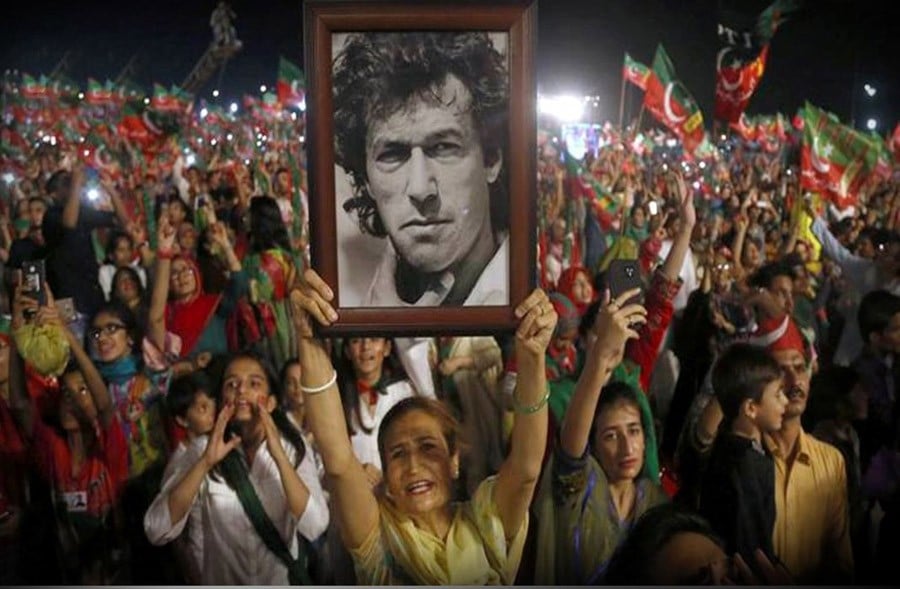
The powers-that-be need to realise that an uninterrupted and undiluted process of election is essential for democracy to filter those who do not deliver

Pakistan has the hallmarks of a typical post-colonial state. The recent general election, marred by strong allegations of rigging, in the country just attested to the inevitable fact that it is the unelected executive offices and not their elected counterparts that guide politics, a stubborn hangover from the colonial past.
What PTI owes its election victory to? Imran Khan remains popular among the masses for a plethora of reasons. To date, he remains the only captain to win cricket world cup for Pakistan back in 1992. In the realm of philanthropy, his two cancer hospitals reportedly treat 70 per cent of their patients free of cost. More, he is financially non-corrupt, untested, athlete and handsome.
Khan successfully highlighted the issue of corruption that undoubtedly afflicts every sector of the country. In retrospect, Imran Khan stood against dynastic politics in the country, took strong exception to plunder of the national wealth and demanded free and fair elections.
Post 2013 election, his PTI held Nawaz Sharif, the three times prime minister, accountable for the alleged rigging in the election. Similarly, Panama Papers leaks established the Sharif family’s link to owning companies overseas that Imran pleaded were established by the taxpayers’ money and asked that the prime minister must resign and face the trial. The court trial eventually led to Sharif’s downfall as a prime minister. In Avenfield properties case, an accountability court case handed the ousted prime minister ten years imprisonment for owning properties beyond known income.
Nevertheless, these reasons pale before Khan’s immense coverage through electronic media. Prelude to 2013 general election and afterwards, no politician could match the media attention he was given. Media would air Khan’s otherwise very non-serious talk for hours to the detriment of pressing issues of national importance ranging from CPEC to the grievances of the smaller provinces.
An impression of Khan being the savior of the country was cultivated. That earned Imran a massive following not only among the youngsters but also a large number of popular stars from sports and entertainment industries subscribed to Khan’s popular slogans of Naya Pakistan and Tabdeeli. Sensing the direction of the wind, lotas (turncoats), who never had the difficulty to fit in for their narrowly conceived goals, defected to PTI and were warmly welcomed!
Ironically, Imran Khan’s Naya Pakistan seems to be a throwback to the old Pakistan which he claims to replace. Khan accepted into his PTI’s fold the turncoats euphemistically called "electables" whom he would always call as corrupt when they were members of PPP and PML-N. Over the years, Khan has honed the skill of pragmatism. His electoral strategy of winning over the electables in Punjab, mainly feudal lords, biraderi leaders and pirs, is a legacy of the Pakistan movement from the last days of the Raj. "You don’t contest elections to be a good boy," Khan confessed. "After 1997, I came to the conclusion that unless we took people in the party who know the art of winning election, we will not be able to succeed."
It has always been a rule than exception that in order to win majority in Pakistani elections, a party, besides being popular, must award tickets to electables, lavish money and get the patronage from the unelected executive offices. PTI left nothing to imagination in making good use of all the four, reducing election to alleged selection after the knocking out of some 30 ‘electables’ from PML-N in a questionable manner.
The general election was criticised more for the pre-poll rigging. Although there was no rigging on the election day there was a "lack of equality of opportunity" and "systematic attempts to undermine the ruling party" ahead of the election, noted the chief of 120-strong EU election observer mission adding that election process was not "as good as 2013".
Like any other catch-all political party in the country, PTI used religion to capture power. Khan has envisioned a Medina-like welfare state, visited Barelvi shrines, paid homage to sufis in the run-up to election and vowed to not alter second amendment to the constitution that declared Ahmedis as non-Muslim minority. Thus, the so-called ‘new’ Pakistan, which is the old one by new name, has come about through dirty tricks of the past.
Nevertheless, these all factors, though making Khan hugely popular, failed to convince enough voters to make Khan the prime minister until he was picked for the post in one of Pakistan’s dirtiest elections that saw heavy-handed tactics in favour of the conceived messiah at the expense of his political rivals especially his main political nemesis, Sharif, who was put behind bars in a dubious though not unprecedented manner.
For powerbrokers, Khan is not the ideal choice because he is Mr. Clean, untested and the only choice left to manage state affairs. Neither corruption nor mismanagement warranted Sharif’s ouster. In the godfather’s scheme of things, unlike Nawaz Sharif who knew more than what could ideally be warranted and hence became more challenging than what could be tolerated, Imran Khan is politically novice and it would take him more than five-year term to know beyond the basics of statecraft let alone challenging internal and external security policies.
Secondly, in the ‘war of narratives’, Khan has been toeing the establishment narrative that it is because of civilian inefficiency, incompetence and corruption that military is every time forced into taking the reins of power which otherwise it has never been interested to send packing civil government home. How would real change come about?
The powers-that-be need to realise that an uninterrupted and undiluted process of election is essential for democracy to filter those who do not deliver. Remember, democracy is not only a system of government, it is a culture too. Like any other culture, democracy needs time to strike deep roots. India has been performing well on the count!